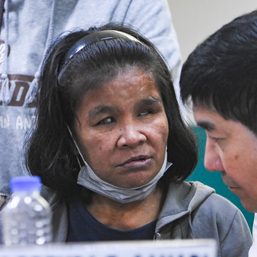SUMMARY
This is AI generated summarization, which may have errors. For context, always refer to the full article.

MANILA, Philippines – Women in politics are subjected to the brutal spread of fake sex scandals and the rampant use of misogynistic insults as political tools to discredit their bid, according to the studies presented by researchers from University of the Philippines (UP) and Far Eastern University (FEU).
“Cybermisogyny and human rights,” a study by Elizabeth L. Enriquez, associate professor at the College of Mass Communication, University of the Philippines Diliman, talked about how female politicians, and their daughters — among many other politically-engaged women — face an “appalling number of misogynistic memes, posts,” and even fabricated sex videos, as a consequence of being vocal about political and social issues.
According to the study, cybermisogyny is “the intense prejudice against and contempt for women,” which translated to the attacks seen on social media.
Justin Muyot, a technical consultant at the FEU Public Policy Center, also backed this claim in his study, “Weapons of Mass Distraction: Harnessing the Appeal of Sex Scandals Against Political Opposition.” The study pointed out how men in politics were tolerated in their sexual affairs and celebrated for their machismo, while women involved in politics suffer from sexually charged issues founded on disinformation.
During the 2022 Philippine elections, Vice President Leni Robredo’s daughters, Aika Robredo and Tricia Robredo, became victims of fabricated sex videos purported to be part of a smear campaign against their mother who ran for President. (READ: Like sister Aika, Tricia Robredo seeks NBI probe into fake sex video scandal)
Alluding to President Rodrigo Duterte, known for normalizing rape jokes and making lewd comments about women, Enriquez said: “The viciousness seems to have risen in proportion and in coincidence with the coming to power of the most misogynistic president Filipinos have had the tragic misfortune of suffering in the last six years.” (READ: From ‘fragrant’ Filipinas to shooting vaginas: Duterte’s top 6 sexist remarks)
Misogyny as political tool
In recent years, cyber misogyny has become more nasty during the era of the sexist and foul-mouthed president of the Philippines, up to the recently concluded 2022 Philippine elections.
Among the long list of dehumanizing tirades against women involved in politics, the two research papers pointed out how Senator Leila de Lima — former chair of the Commission on Human Rights (CHR), Justice Secretary, and a vocal critic of Duterte — was subjected by her male colleagues to a slanderous and irrelevant inquiry regarding her romantic relationship with former security aide, Ronnie Dayan. The slanderous rhetoric was made in the midst of the De Lima drug trafficking investigation, which was now believed to be made of trumped-up charges. (READ: Ronnie Dayan latest to recant in De Lima case).
The “Joenel” meme, a reference to how Senator de Lima would allegedly call her former aide “in a sweet tone,” circulated on the internet and further discredited the senator. Deepfakes of her face where also used in pornographic videos to diminish the politician.
While De Lima was pilloried for her affair, the study made by Muyot emphasized its glaring difference from the public’s reception of the extramarital affairs of former President Joseph Estrada and the incumbent President Duterte.
In 2022, the condescending remarks and fabricated sex videos were revived and used against De Lima in the election season.
“References to her alleged sex scandal have also dragged down Senator De Lima’s reelection bid and her call for justice. In a review of tweets (excluding replies) mentioning “Leila de Lima” from the official start of the campaign period to 30 April 2022, she has been repeatedly shamed and portrayed as a promiscuous woman,” Muyot stated.
During the campaign period, the use of fake sex videos were also weaponized against Aika Robredo and Tricia Robredo, daughters of VP Robredo. Pornographic videos with clickbait titles bearing the Robredos’ names lead to random videos which do not involve them.
Enriquez explained that, “The attack on the young Robredos is obviously an attempt to damage their mother’s bid for the presidency. Many are shocked but not surprised, given the increasingly heated campaign in which the only female candidate is perceived to pose a formidable threat to the nine other presidential aspirants, all male.”
Aside from the spread of fabricated sex videos, misogynistic posts were also used to target women involved in politics — from lawmakers, activists, to journalists.
“Cybermisogyny and human rights” cited a few gender-related derogatory remarks hurled at Rappler journalists, such as, “college sorority bloggers,” and “Rapplerettes.” The study described this move as an “infantilization of women,” or a way of diminishing women by framing them as “immature.”
A number of posts on Facebook were also mentioned on the study, with one user red-tagging Kabataan Partylist representative, Sarah Elago, and inciting that the lawmaker should be “gangbanged” by drug addicts. A similar remark was also thrown against an activist who decried the burial of the late dictator Ferdinand E. Marcos in the national heroes’ cemetery. (READ: Sarah Elago: Lawmaker under attack)
Asked about challenges will the fight against cybermisogyny may face, Enriquez stated during the Facts First PH Research Briefing: “Big [businesses], the ones that benefit so much from this platform will put up a fight, and it’s going to be a messy fight. Why is it allowed online? Because it makes money.”
“All of these people joining the cyber mob actually drive up the numbers that they need for the business to expand and survive,” she added. – Rappler.com
Add a comment
How does this make you feel?
![[DECODED] The Philippines and Brazil have a lot in common. Online toxicity is one.](https://www.rappler.com/tachyon/2024/07/misogyny-tech-carousel-revised-decoded-july-2024.jpg?resize=257%2C257&crop_strategy=attention)







![[Free to Disagree] Arrest Quiboloy!](https://www.rappler.com/tachyon/2024/03/Free-to-disagree-arrest-quiboloy-March-11-2024-1.jpg?resize=257%2C257&crop_strategy=attention)

There are no comments yet. Add your comment to start the conversation.